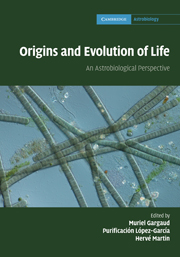Book contents
- Frontmatter
- Contents
- List of contributors
- Foreword
- Preface
- Part I What is life?
- 1 Problems raised by a definition of life
- 2 Some remarks about uses of cosmological anthropic ‘principles’
- 3 Minimal cell: the biologist's point of view
- 4 Minimal cell: the computer scientist's point of view
- 5 Origins of life: computing and simulation approaches
- Part II Astronomical and geophysical context of the emergence of life
- Part III The role of water in the emergence of life
- Part IV From non-living systems to life
- Part V Mechanisms for life evolution
- Part VI Life in extreme conditions
- Part VII Traces of life and biosignatures
- Part VIII Life elsewhere?
- Index
5 - Origins of life: computing and simulation approaches
from Part I - What is life?
Published online by Cambridge University Press: 04 February 2011
- Frontmatter
- Contents
- List of contributors
- Foreword
- Preface
- Part I What is life?
- 1 Problems raised by a definition of life
- 2 Some remarks about uses of cosmological anthropic ‘principles’
- 3 Minimal cell: the biologist's point of view
- 4 Minimal cell: the computer scientist's point of view
- 5 Origins of life: computing and simulation approaches
- Part II Astronomical and geophysical context of the emergence of life
- Part III The role of water in the emergence of life
- Part IV From non-living systems to life
- Part V Mechanisms for life evolution
- Part VI Life in extreme conditions
- Part VII Traces of life and biosignatures
- Part VIII Life elsewhere?
- Index
Summary
Introduction
The scope of life models and simulations is as broad as that of biology. It encompasses studies on cell metabolism, intercellular communication, immunology, physiology, development, cognitive processes, molecular evolution, population genetics, epidemiology etc. However, for the purpose of the present book, we will focus on the use of computing and simulation approaches as tools for studying the origins of life. Under the global denomination of ‘automata’, a large number of different frameworks have been used to implement and test models accounting for the emergence of life.
Despite their diversity, these approaches call upon the same fundamental grounding: bottom-up model building. Instead of identifying state variables of the whole system and formulating their relationships by equations, the idea is to start with elementary components and then specify how they interact with one another and with the environment. The whole system behaviour is therefore not an a priori descriptor of the model, but rather emerges from within the system. This kind of reasoning is obviously appropriate for research on the origins of life, where the main question is precisely to find out how a property (life) which is valid for the system (a living being) has emerged out of multiple elements (chemical components), which are not individually endowed with this property.
- Type
- Chapter
- Information
- Origins and Evolution of LifeAn Astrobiological Perspective, pp. 66 - 82Publisher: Cambridge University PressPrint publication year: 2011
- 1
- Cited by

